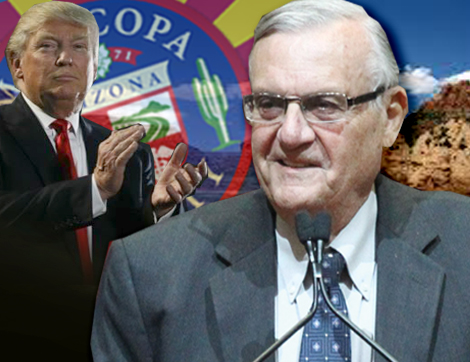
On Nov. 8, America’s toughest sheriff, Joe Arpaio, lost his re-election bid. However, at a young 84 years old, the seasoned lawman says he has no plans to slow down any time soon. AFP recently sat down with Arpaio to discuss his plans for the future, which include furthering his investigation into Barack Obama’s birth certificate.
By Mark Anderson
PHOENIX, Ariz.—Sheriff Joseph Michael “Joe” Arpaio’s accomplishments prove he’s the kind of man every thinking citizen would want as the top law enforcement officer of their community. Yet he has been forced to face down lawsuit after lawsuit brought by well-funded “civil rights” groups and the federal government—all because he is an honest lawman, who has only sought to protect his county.
AFP recently had the chance to sit down with “America’s toughest sheriff” to discuss, among other things, what he plans to do since he lost the election on Nov. 8. His last official day as sheriff is Dec. 31, and, at 84, Arpaio plans to end his front-lines law enforcement career, but he is not backing down and has been quite vocal about the most important issues facing this country.
In most mainstream press accounts on Arpaio, what’s typically absent is that the sheriff has spent a lifetime in public service. He volunteered for the Korean War with the U.S. Army and was an innovative and effective Drug Enforcement Administration (DEA) agent. In that federal role, he undertook difficult and often dangerous jobs overseas early in his career. His ensuing DEA accomplishments would later have a profound effect on his 24 years in local law enforcement as head of the nation’s third-largest sheriff’s department, located in Maricopa County, Ariz., a large county that boasts the state capital of Phoenix as its seat.
Long before Arpaio became known as “the toughest sheriff in America”—a title ironically minted by the often-hostile corporate media—he had already established a stellar law enforcement career.
In order to be a pro-active, effective crime fighter, Arpaio was stationed in foreign countries where he headed DEA operations to combat the drug trade in areas that, even by today’s standards, are highly volatile, including Turkey, the Middle East, Mexico, and Central and South America. Interestingly, he was also a diplomatic attaché.
It was during those DEA years that Arpaio gained valuable expertise on border issues and related enforcement, including in the border states of Arizona and Texas.
Under his leadership as sheriff, Arpaio’s office covered a lot of ground, having built “two new jails, a sheriff’s academy, a food factory, a firearms range, and the first headquarters in the organization’s history, equipped with a state-of-the-art 911 center unrivaled by any in the country,” according to Arpaio’s media liaison.
Bug Out While You Still Can! Learn More…
First elected in 1992, Arpaio’s nearly quarter-century at the helm made him the longest-serving elected sheriff in Maricopa County’s history. He consistently earned high public approval ratings on the job. Arpaio maintains the following credo that has been the basis of his overall 55 years in law enforcement: “The only real boss I have is the public.”
AFP caught up with the busy lawman for an exclusive interview on Dec. 8, one month after he lost his re-election effort to serve a seventh four-year term. Former Phoenix Police Department Sgt. Paul Penzone, 49, reportedly won the election with 56% of the vote, to Arpaio’s 44%.
In the on-the-record interview with AFP (supplemented by an unrecorded get-acquainted interview Dec. 7) AFP asked whether Penzone will carry on the policies that had been established under Arpaio’s leadership, especially the effective efforts toward improved border security.
“I’m not going to comment. . . . I’m not the sheriff anymore,” the still-energetic 84-year-old lawman replied. “I will stand by [and I’m] very proud of what was accomplished in 24 years. . . .”
And while saying, “I’m not going to go away,” just before this AFP edition went to press, he announced that his well-known research into President Obama’s long-form birth certificate—which states that the 44th president was born in Hawaii, but which Arpaio maintains is a forgery—was to be covered again by Arpaio at a Dec. 15 press conference intended to shed new light on the contentious matter.
Furthermore, Arpaio plans on hitting the lecture circuit to keep the issue of border security front and center, among other key topics.
“I will be speaking about what I have done and . . . on what should happen in the future,” he said, “especially when you deal with politics and law enforcement.”
FLOW OF ILLEGAL DRUGS CAN BE CHOKED OFF
“I was one of probably two agents under the U.S. Bureau of Narcotics—you know, I go way back to 1957—that served in foreign countries. Actually, I went to the ‘hot spot,’ which was Turkey and the Middle East, to stop the flow of drugs from that area going into France and then into the United States, [all of which was] controlled by the mafia,” Arpaio stated about his DEA days. “That was the big heroin problem we’d had for 35 years.”
That international heroin route was choked off effectively, proving that Arpaio’s approach then was the proper one—an approach that should be reinstated.
“So the concept was, and still should be, that the way of solving the problem [is] you stop it overseas before it gets to our border,” Arpaio stressed. “If it doesn’t get to our border, we don’t have any problem with the drugs . . . being used by our young people, with this heroin epidemic that we have presently.”
However, during his time as sheriff, just 30 miles from the U.S. border with Mexico, he didn’t have the authority to cross the border to get things done, unlike the situation during his DEA days.
“Everybody discouraged me from going across the border to meet the president of Mexico because of the danger and ‘hits’ on me,” he said. “So I stick with the philosophy—you stop [drugs] in a foreign country, and if it does get across the border, you lock [the traffickers] up, throw them in jail, and also crack down on the drug traffic on the street level.”
That’s because the smaller dope peddlers on the streets frequently duck law enforcement, Arpaio explained. He further recommended a renewed cooperation between U.S. and Mexican government agencies in order to reduce the human trafficking, which, he says, is directly tied to the drug trade, since many ordinary Mexicans illegally entering the U.S. to escape domestic regional violence and find work on U.S. farms and elsewhere are exploited by the drug cartels as “mules” to smuggle drugs into the U.S.
“It’s not just illegal immigration,” Arpaio continued, stressing that many people, especially decision-makers, fail to firmly link commonplace illegal immigration with the drug trade. “So when all these politicians run down to the fence and get their picture taken, they’re always talking about illegal immigration. You would think they might throw in, ‘Let’s stop the drug problem.’ ”
THE DRUG PROBLEM
American Free Press asked about current sources of heroin and other drugs.
“The majority of the drugs today—guess what—come from Mexico . . . . And when we cracked down on methamphetamine [production] in this country, who picked up the slack? It’s Mexico,” said Arpaio.
In that vein, Arpaio believes that any country that’s a part of the conduit of trafficking drugs and people into the U.S. should have its foreign-aid money withheld until the country cooperates with the U.S. in solving the overall problem. If the U.S. is so bent on spending billions to send its troops to lead coalitions to fight terrorism in distant lands, then U.S. and Mexican military cooperation is long overdue to stop drug-related terrorism right at the U.S. doorstep, he added.
Speaking of his time as a federal officer working against the drug trade on the Mexican side of the border, he recalled: “When I was over there, we worked with the Mexican army—in fact, I worked very closely with them and the federal police on the streets. . . . My point was, at least let’s try to get the U.S. Border Patrol across the border like my agents were across the border during operations.”
He summarized: “I don’t know why that’s a big deal when we’ve got [the] military in foreign countries, helping fight terrorism and other situations. Why can’t we do that here? I know it’s controversial, but it can be done.”
TRUMP MEANS BUSINESS
“I’m very happy Donald Trump is the president . . . and I’m happy that I supported him from day one,” Arpaio told AFP.
Arpaio is confident that the election of Trump will bring significant changes in terms of building the rest of the border fence, while spurring other technological and manpower changes to enhance border security and also improve the U.S. economy, among other goals that the populist businessman has announced.
Arpaio also acknowledged that dissolving the NAFTA trade treaty—since such a move likely would improve the Mexican economy—could reduce the incentive for illegal migration into the U.S.
“Maybe [Trump] can make a deal. . . . I’m very proud that he got in to meet the Mexican president, so things can be done if you really want to do them,” Arpaio said. “[We have] the greatest country in the world and you’re trying to tell me that we can’t stop the drug traffic coming in from a bordering country?”
He continued: “We can do it if we have the will to do it, and it was done under President Nixon and I lived under that [when] he said we’re going to stop this international heroin traffic . . . involving the Middle East, France, Mexico, and our country. [It] was stopped. There was no more heroin.”
Anticipating better times, Arpaio mentioned the Trump transition team’s nomination of retired four-star Marine Gen. John F. Kelly as Department of Homeland Security secretary. Arpaio also likes Trump’s nomination of Sen. Jeff Sessions (R-Ala.), a former Alabama attorney general, for the nation’s AG post.
“I didn’t put my name out, but according to the news media, I was in the running for that [AG] job,” Arpaio remarked. “But I am very happy that Kelly has that [DHS] job, because he has foreign experience and has been involved in [facing] the drug problem.”
Kelly also has confronted immigration issues.
PUNISHED FOR SUCCESS
Meanwhile, Arpaio is on the receiving end of a federal misdemeanor charge, stemming from his department’s successful implementation of the “287(g)” program from 2007 to 2009.
Under the program, 150 of Arpaio’s deputies were trained and sworn in, having been given the authority, just like federal immigration officers are empowered, to arrest those who are in the U.S. illegally. Hundreds of “illegals” were arrested, processed, and turned over to federal authorities, although the feds’ deportations were so incomplete that nearly 40% of them would be repeatedly arrested by Arpaio’s department. One man returned 24 times.
“That [program] was taken away from me because I think we did too good of a job. . . . Of course, it caused me political and other problems, but it was worth it,” Arpaio reflected.
In what started as a lesser “racial profiling” matter over Arpaio’s 287(g) operation, a federal judge referred Arpaio to the U.S. Attorney’s Office for possible criminal prosecution on contempt-of-court charges, a misdemeanor, due to the sheriff’s office’s alleged failure to comply with the court’s order to stop its “racial profiling” practices. Arpaio’s initial Dec. 6 federal trial date in Phoenix was postponed until April 2017.
Undaunted, Arpaio added, “I think we ought to reinstate that program because we do have other federal agencies that go to local and state authorities. . . . [The feds] can’t do the job alone and nobody has complained about local [law enforcement] arresting the gun dealers and drug dealers and helping the feds,” Arpaio said. “Why is it such a controversy when we go one step further and help the feds with illegal immigration?”
Under the Trump administration, “I’m sure there will be a big change on fighting crime, the war on cops, immigration, drugs, terrorism, and I can go on and on. It sure can’t get any worse than it has been under [President] Obama and other high officials.”
SOROS MEDDLING
Perhaps unsurprisingly, notorious billionaire activist George Soros—arguably the most malicious elitist of our time—helped block Arpaio’s re-election.
Soros’s hand in this matter became clear “when there’s 30 days to go, with early voting, and [Soros] pumps in $3 million to get rid of me, and I’m the only sheriff he’s ever gone after,” Arpaio noted. The contempt of court charge came about the day before early voting began “and they did it again two weeks into early voting.” And when that news hit the media, the news scribblers speculated non-stop that Arpaio “could go to jail for six months.”
Yet, the 4 million-plus people living in Maricopa County had kept rehiring Arpaio since, deep down, they knew an effective lawman when they saw one. It took the corrupt, soon-to-be-obsolete media, in tandem with a twisted malefactor like Soros, to manipulate public perception just enough to prevent what otherwise would have been a seventh term for the nation’s toughest lawman whose tactics in fighting the heroin scourge, hopefully, will be reinstated across the nation under Trump. We can only hope Arpaio’s career is not over. America needs more men like him.
Mark Anderson is a longtime newsman now working as the roving editor for AFP. He is also the chairman of the America First Action Committee, a group dedicated to mobilizing grassroots Americans to pressure Congress on bad legislation and support Congress on good legislation. Email him at [email protected].



